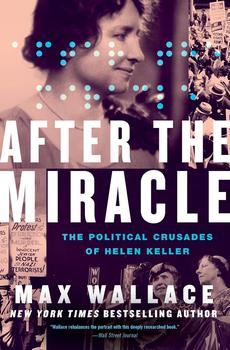Summary | Excerpt | Reading Guide | Discuss | Reviews | Beyond the book | Read-Alikes | Genres & Themes | Author Bio

Mrs. Orwell's Invisible Life
by Anna FunderThis is the story of the marriage behind some of the most famous literary works of the 20th century - and a probing consideration of what it means to be a wife and a writer in the modern world.
At the end of summer 2017, Anna Funder found herself at a moment of peak overload. Family obligations and household responsibilities were crushing her soul and taking her away from her writing deadlines. She needed help, and George Orwell came to her rescue.
"I've always loved Orwell," Funder writes, "his self-deprecating humour, his laser vision about how power works, and who it works on." So after rereading and savoring books Orwell had written, she devoured six major biographies tracing his life and work. But then she read about his forgotten wife, and it was a revelation.
Eileen O'Shaughnessy married Orwell in 1936. O'Shaughnessy was a writer herself, and her literary brilliance not only shaped Orwell's work, but her practical common sense saved his life. But why and how, Funder wondered, was she written out of their story? Using newly discovered letters from Eileen to her best friend, Funder re-creates the Orwells' marriage, through the Spanish Civil War and the Second World War in London. As she peeks behind the curtain of Orwell's private life she is led to question what it takes to be a writer—and what it is to be a wife.
A breathtakingly intimate view of one of the most important literary marriages of the twentieth century, Wifedom speaks to our present moment as much as it illuminates the past. Genre-bending and utterly original, it is an ode to the unsung work of women everywhere.
There is pain, sadness, and anger in Wifedom, an acute recognition of the ways "wifedom" can be a "wicked magic trick" that obscures and omits the sacrifices of women. In retrieving Eileen Blair "from behind the Cerberus," Funder puts her squarely back in frame as her own person and not just "Mrs. Orwell."..continued
Full Review
(833 words)
This review is available to non-members for a limited time. For full access,
become a member today.
(Reviewed by Peggy Kurkowski).
 Readers might be forgiven if, in reading George Orwell's Homage to Catalonia, they miss the fact that his first wife, Eileen Blair, was in Spain with him, working for the Republican resistance against Franco's fascist forces. As Anna Funder points out in Wifedom: Mrs. Orwell's Invisible Life, when George does refer to her, he does not even use her given name; she becomes merely "my wife."
Readers might be forgiven if, in reading George Orwell's Homage to Catalonia, they miss the fact that his first wife, Eileen Blair, was in Spain with him, working for the Republican resistance against Franco's fascist forces. As Anna Funder points out in Wifedom: Mrs. Orwell's Invisible Life, when George does refer to her, he does not even use her given name; she becomes merely "my wife."
In a Guardian article, the author expands on this act of erasure. "In Homage, Orwell mentions ‘my wife' 37 times but never once names her. No character can come to life without a name. But from a wife, which is a job description, all can be stolen." Eileen's contributions to the war effort were not inconsequential, as she was constantly on the move:...
This "beyond the book" feature is available to non-members for a limited time. Join today for full access.

If you liked Wifedom, try these:

by Tan Twan Eng
Published 2024
From the bestselling author of The Garden of Evening Mists, a spellbinding novel about love and betrayal, colonialism and revolution, storytelling and redemption.

by Max Wallace
Published 2024
In this powerful new history, New York Times bestselling author Max Wallace draws on groundbreaking research to reframe Helen Keller's journey after the miracle at the water pump, vividly bringing to light her rarely discussed, lifelong fight for social justice across gender, class, race, and ability.
Outside of a dog, a book is man's best friend. Inside of a dog it's too dark to read.
Click Here to find out who said this, as well as discovering other famous literary quotes!